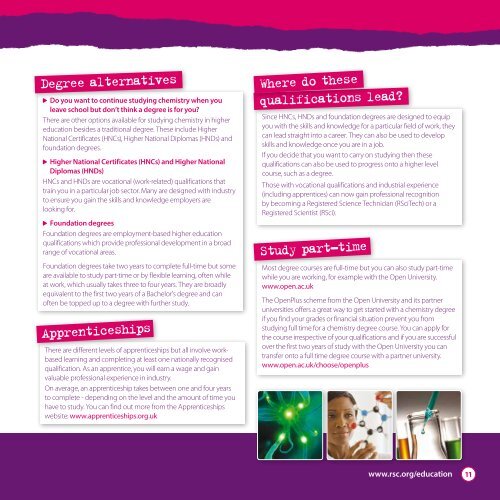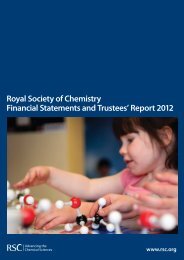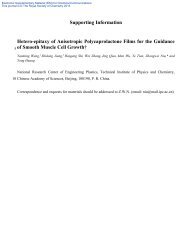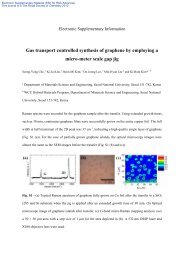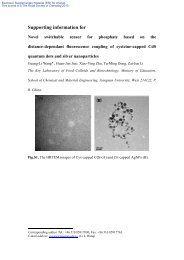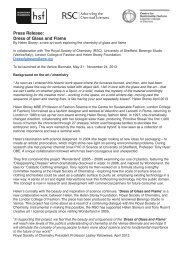Degrees in Chemistry - Royal Society of Chemistry
Degrees in Chemistry - Royal Society of Chemistry
Degrees in Chemistry - Royal Society of Chemistry
You also want an ePaper? Increase the reach of your titles
YUMPU automatically turns print PDFs into web optimized ePapers that Google loves.
Degree alternatives<br />
Do you want to cont<strong>in</strong>ue study<strong>in</strong>g chemistry when you<br />
leave school but don’t th<strong>in</strong>k a degree is for you?<br />
There are other options available for study<strong>in</strong>g chemistry <strong>in</strong> higher<br />
education besides a traditional degree. These <strong>in</strong>clude Higher<br />
National Certificates (HNCs), Higher National Diplomas (HNDs) and<br />
foundation degrees.<br />
Higher National Certificates (HNCs) and Higher National<br />
Diplomas (HNDs)<br />
HNCs and HNDs are vocational (work-related) qualifications that<br />
tra<strong>in</strong> you <strong>in</strong> a particular job sector. Many are designed with <strong>in</strong>dustry<br />
to ensure you ga<strong>in</strong> the skills and knowledge employers are<br />
look<strong>in</strong>g for.<br />
Foundation degrees<br />
Foundation degrees are employment-based higher education<br />
qualifications which provide pr<strong>of</strong>essional development <strong>in</strong> a broad<br />
range <strong>of</strong> vocational areas.<br />
Foundation degrees take two years to complete full-time but some<br />
are available to study part-time or by flexible learn<strong>in</strong>g, <strong>of</strong>ten while<br />
at work, which usually takes three to four years. They are broadly<br />
equivalent to the first two years <strong>of</strong> a Bachelor’s degree and can<br />
<strong>of</strong>ten be topped up to a degree with further study.<br />
Apprenticeships<br />
There are different levels <strong>of</strong> apprenticeships but all <strong>in</strong>volve workbased<br />
learn<strong>in</strong>g and complet<strong>in</strong>g at least one nationally recognised<br />
qualification. As an apprentice, you will earn a wage and ga<strong>in</strong><br />
valuable pr<strong>of</strong>essional experience <strong>in</strong> <strong>in</strong>dustry.<br />
On average, an apprenticeship takes between one and four years<br />
to complete - depend<strong>in</strong>g on the level and the amount <strong>of</strong> time you<br />
have to study. You can f<strong>in</strong>d out more from the Apprenticeships<br />
website: www.apprenticeships.org.uk<br />
Where do these<br />
qualifications lead?<br />
S<strong>in</strong>ce HNCs, HNDs and foundation degrees are designed to equip<br />
you with the skills and knowledge for a particular field <strong>of</strong> work, they<br />
can lead straight <strong>in</strong>to a career. They can also be used to develop<br />
skills and knowledge once you are <strong>in</strong> a job.<br />
If you decide that you want to carry on study<strong>in</strong>g then these<br />
qualifications can also be used to progress onto a higher level<br />
course, such as a degree.<br />
Those with vocational qualifications and <strong>in</strong>dustrial experience<br />
(<strong>in</strong>clud<strong>in</strong>g apprentices) can now ga<strong>in</strong> pr<strong>of</strong>essional recognition<br />
by becom<strong>in</strong>g a Registered Science Technician (RSciTech) or a<br />
Registered Scientist (RSci).<br />
Study part-time<br />
Most degree courses are full-time but you can also study part-time<br />
while you are work<strong>in</strong>g, for example with the Open University.<br />
www.open.ac.uk<br />
The OpenPlus scheme from the Open University and its partner<br />
universities <strong>of</strong>fers a great way to get started with a chemistry degree<br />
if you f<strong>in</strong>d your grades or f<strong>in</strong>ancial situation prevent you from<br />
study<strong>in</strong>g full time for a chemistry degree course. You can apply for<br />
the course irrespective <strong>of</strong> your qualifications and if you are successful<br />
over the first two years <strong>of</strong> study with the Open University you can<br />
transfer onto a full time degree course with a partner university.<br />
www.open.ac.uk/choose/openplus<br />
www.rsc.org/education<br />
11


